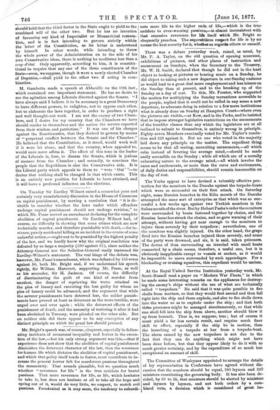Mr. Bright's speech was, of course, eloquent, especially in deline-
ating incidents of occasional inequality and horror in the execu- tion of the law,—but his only strong argument was this,—that if experience does not show that the abolition of capital punishment diminishes the deterrent character of the law, then the reverence for human life which dictates the abolition of capital punishment, and which that policy itself tends to foster, must contribute to in- crease the general horror felt for murderous passions throughout the community. That sounds plausible, but we question much whether "reverence for life" is the true antidote for brutal passions. That mere reverence for life, as life, which hesitates to take it, but does not hesitate at all to take all the hope and spring out of it, would do very little, we suspect, to scotch evil paasions. Paradoxical as it may seem, the tendency to subordi- nate mere life to the higher ends. of life,—which is the true antidote to over-weening passionar—is almost inconsistent with that excessive reverence for life itself whit* Mr. Bright so eloquently preaches. The superstitious respect for life is by no means the best security for it, whether as regareloothers or oneself.


































 Previous page
Previous page